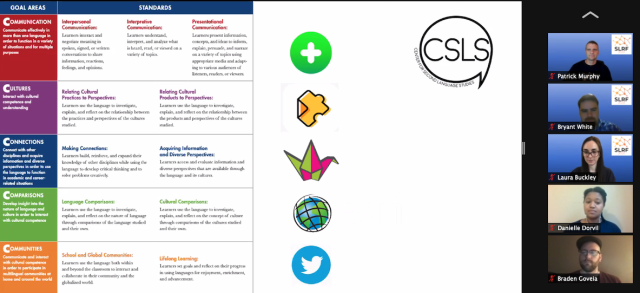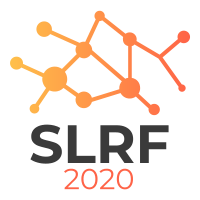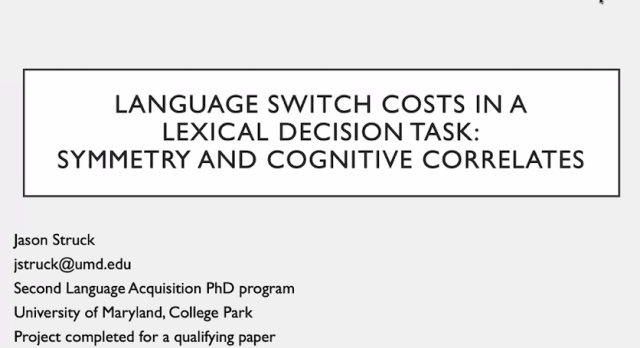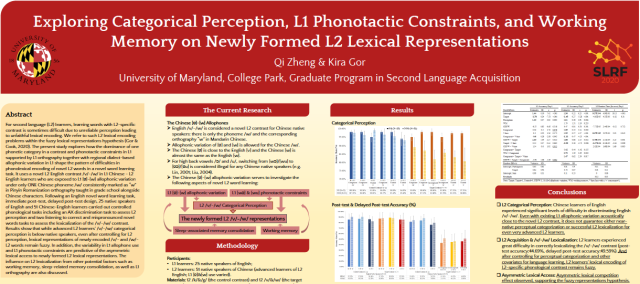By Tetiana Tytko
The 2020 Second Language Research Forum (SLRF) conference, which annually unites students and faculty from various fields of SLA and Applied Linguistics, has changed its format and, due to the global pandemic, was held virtually. This year’s virtual forum was hosted by Vanderbilt University. For several months, the organizers thoroughly planned the transition to virtual space in order to provide all the participants with an opportunity to present their posters and papers virtually as well as attend the usual workshops, plenary talks, and colloquia via Zoom. Despite this substantial change to SLRF that both organizers and participants had to undergo, five UMD graduate students from the SLA program presented their research at SLRF 2020.

Jon Malone presented the findings of his second qualifying paper on crosslinguistic influences, proficiency, and modality in L2 lexical network access in a session designed as an “in-progress roundtable.” Jon pointed out that presenting in under 12 minutes, which was the time allotted for the talk, was certainly a challenge. However, Jon also admitted the benefits of this time reduction, which made his presentation “sharper, clearer, cleaner, and more focused… I know that I was able to get the basic message across. This is a good exercise for us as researchers.” From Jon’s own experience the most meaningful conversation about a study doesn't usually occur at a conference, but it can begin there. Jon compared the conference to “a wine tasting event” which can give you a sense of the flavors, and he felt the 2020 SLRF format fit this design much better than some full conferences he has attended.
Jason Struck presented his study on language switch costs in a lexical decision task as an individual paper. After the conference, he shared his experience of presenting and attending Virtual SLRF 2020. Conversely to Jon’s observations, Jason commented on the shortcomings of the virtual conference. He missed out on the one-on-one follow-up after paper presentations as due to the tight schedule, all Zoom rooms were closed after the last presenter in the session. “In a non-virtual conference, it would have been possible to chat with others about their and my presentations as we walked between physical rooms,” Jason said after the forum. On the bright side, Jason was pleased that all the poster presenters had chance to upload their posters in advance so that the conference attendees could browse them before the presentation and read them at their own pace.
Qi Zheng presented her study on categorical perception, L1 phonotactic constraints, and working memory on newly formed L2 lexical representations as a poster presentation. She highlighted several positives about attending the forum virtually this year as a participant and a presenter, saying, “Attending a virtual meeting is mentally and physically less of a burden since you can simply sit in front of your computer, and if you want you can switch to different meetings at all times without physically moving around or being afraid that your sudden walk in might disturb the presentation.” In turn, Qi emphasized that while attendees could better organize their time and attend numerous talks of their interest, presenters had to be concise and creative to not lose the audience members who could leave the session in one click by exiting a Zoom room. While preparing for her presentation, Qi rehearsed several times and recommended “keeping things straightforward yet logical.”
Nick Pandža contributed to a group project presented at SLRF. Nick assisted the research group from Kent State University with statistical analysis. Their presentation on individual differences in episodic memory abilities in L2 lexical access induced many interesting discussions following the talk.
Tetiana Tytko presented an individual paper on implementing web-based collaborative reading strategies in L2 instruction and a group project with former colleagues and faculty from Ohio University. Tetiana said that presenting at Virtual SLRF 2020 resembled real conference experience. She praised the organization, schedule, and reduced conference participation fee, and added that, “the ability to attend so many other presentations safely from your own home made this conference a perfect example of resolving the pandemic issue on the conference level.” Tetiana is convinced this forum showed how it is possible to adjust to the new reality, and with the help of technology exceed prior expectations.
Virtual SLRF 2020 was a great opportunity for its participants and presenters to share their research and catch up with their colleagues and friends. The overall consensus among the SLAers who presented at SLRF this year was that it was a positive experience, and they encouraged their fellow graduate students to apply to virtual conferences and symposiums. Jon characterized virtual conferences as forcing researchers to take their thoughts and ideas and treat them as "building materials" to sort through and select from, rather than as a finished product. Similarly, Qi noted in the near future, presenting at virtual meetings will be a good practice to further synthesize your study. Additionally, she advised current SLAers to participate in virtual conventions even if they are not going to present at conferences as participation requires no additional funds except for registration. In fact, those who are going to present at future conferences can apply and receive travel funds from the School of Languages, Literatures, and Cultures and the Second Language Acquisition program. Tetiana would strongly encourage everyone to watch for calls for proposals and apply to present within the US and abroad. It has never been easier to present at conferences and symposiums in Europe, Asia, or Australia than it is now. In fact, online conferences have their own benefits such as lower conference fees and broad international audiences, but most importantly they promote the mutual exchange of ideas without the threat of spreading the virus.






